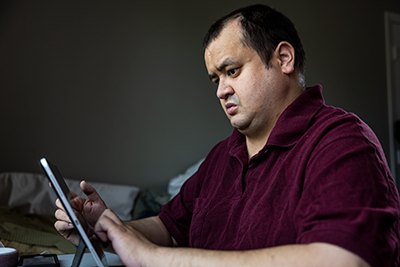An article by guest writer, Frank Eller.

Hi! My name is Frank Eller. I have an Associate of the Arts degree from Turtle Mountain Community College. I am interested in the craft of writing because I feel that writing is a form of art, and it is my belief that one day, my writing will make me successful. A friend of mine suggested Lifeworks to me, and this organization has been a great addition to my search for a proper job in this market. I feel that Lifeworks is a great opportunity for anyone with a disability to find work that suits them best.
To become a good ally for a person with a disability it would be a good idea to spend time learning about disabilities. For example, if you are with a person who suffers from blindness, you can research how they get around by finding out that it is often by using a white cane and a guide dog.
To understand disabilities it is also important to limit assumptions and distance yourself from negative stereotypes. For instance, the negative stereotype that all blind people do not live independently and/or do not live successful lives is not true. In reality, blind people occupy pretty much every occupation that the job market has to offer – especially with the existence of accessible technology.
Advancements in technology have increased accessibility. Education and gaining a better understanding of the accessible technology that is available will help an ally come up with solutions that could potentially aid anybody who has any disability. For example, Stephen Hawking used his electric wheelchair and while he had lost the ability to speak, he could still talk using a voice communicator to answer questions. Another example are bed shakers for people who have hearing loss; when fire alarms go off, their beds will vibrate so if it is late at night and they are asleep, they will wake up. Basically, anybody can become a great ally, if they are willing to learn accessible technology.
Knowledge really is power. Allies can be more aware of independence for each and every person with a disability. For example, If employers advocate for people with disabilities, they could help eliminate fears about accessible technology that the person with the disability needed. Or allies could read books or watch documentaries about people with disabilities.
You can also try living like a disabled person for a few hours or even a day. An ally could borrow a wheelchair for a few hours to learn what it is like to cook and clean and other functions without being on their own two feet.
There are also restaurants that give guests the experience of dining in the dark – an evening where they are essentially eating in a pitch-black space to give them the chance to feel what it is actually and truly like to be a blind individual. So for all intents and purposes, customers eat, drink, and do things such as using a white cane to get around the restaurant and go to the bathroom, while blind. Often, the participants are divided into groups with each one including an actual blind person to share information with patrons on what it is really like to be a blind person. Putting yourself in a disabled person’s shoes can build an understanding of what it is like to live with a disability.
In conclusion, whether you are able bodied or have a disability, we can all learn from each other through diversity and inclusion.
